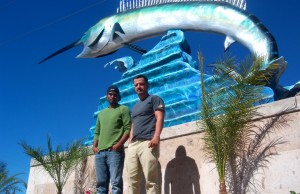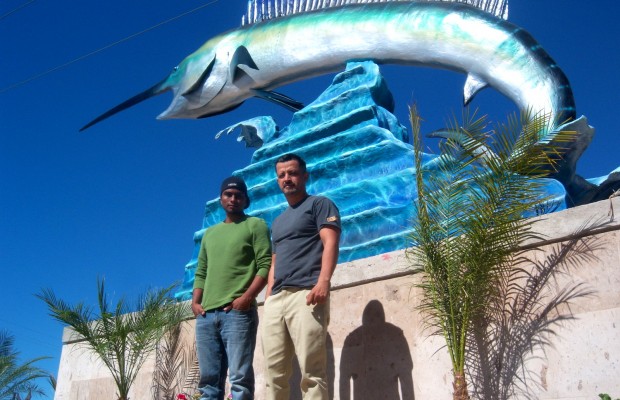Artists Izrael Ríos and Salvador García worked for three days in giving final touches to the sailfish (or marlin as some have stated), located at the intersection of Calle 13 and Blvd. Juárez.
Airbrush artist Izrael Ríos detailed they reviewed pictures of sailfish in preparation of the work, noting details and original colors, which they then painted on car textures to ensure they would hold up to humidity and the sun.
 Painter Salvador García stated he was honored to have participated in this piece, objective of which is to demonstrate to both locals and visitors alike the roots of this port.
Painter Salvador García stated he was honored to have participated in this piece, objective of which is to demonstrate to both locals and visitors alike the roots of this port.
“It is an honor for us to paint this monument; we know there used to exist one like this a while ago. More than a job, we see this as participating in something representative of the local community, which will bring back memories of its youth and inspire feelings,” commented García.
Sculptor Miguel Ángel Sandoval was also involved in the construction of this piece, as well as architect Román Padilla who drew up the plan. Participants also included painter Ignacio Jara and Javier Sandoval of the company PROFIBRA that built the fiberglass figure. The figure itself has a metallic structure built to withstand wind and vibrations from the nearby train tracks, and is filled with polyurethane.
Realizaron artistas locales aerografía para pez vela
Por Azucena Mazón
El artista visual Izrael Rios y Salvador García trabajaron por tres días para dar el último toque al monumento del pez vela ubicado en el entronque de calle 13 y Boulevard Juárez.
El pintor Izrael Ríos dio a conocer que para realizar la aerografía del pez vela revisaron imágenes de esta especie marina para el detallado y los colores originales los cuales fueron pintados con material automotriz con el fin de soportar la humedad y el sol.
Por su parte el pintor Salvador García manifestó sentirse honrado por participar en este trabajo que tiene como fin mostrar a la comunidad local y visitantes las raíces del puerto.
“Es un honor para nosotros pintar este monumentos, sabemos que hace mucho existió uno así , mas que un trabajo lo vemos como una participación en algo representativo para la comunidad local , que les traerá recuerdos de su infancia , mover fibras de sus sentimientos”
En la construcción de esta obra participaron también el escultor Miguel Ángel Sandoval , así como el arquitecto Román Padilla quien realizo el plano del pez , el pintor Ignacio Jara y Javier Sandoval de la empresa PROFIBRA donde construyeron la efigie en fibra de vidrio relleno de poliuretano y con una estructura metálica para soportar los vientos y vibraciones del ferrocarril que cruza a unos cuantos metros.
